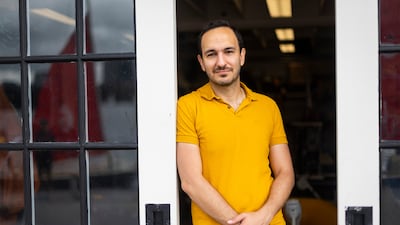A Lebanese professor at the Massachusetts Institute of Technology who specialises in wireless technology and wireless sensing has become the second recipient of the Great Arab Minds Award.
Fadil Adib, associate professor at MIT, won the 2023 award in engineering and technology for his research and inventions that "have significantly expanded the possibilities of wireless sensing technology", the award announcement said.
Prof Adib said he was thrilled to win the award and earn recognition for his accomplishments in the Arab world.
"On one hand, it's an honour, and on the other hand, it's humbling to be considered as someone that younger generations are going to look up to and be inspired by," he told The National.
The 34-year-old tenured professor said he wished that there had been a Great Arab Minds Award when he was growing up in Tripoli.
"I wish there was something like this when I was growing up that had at least lessened some of those doubts because we have a lot of self-doubt," he said.
"And my hope is that it will encourage people to realise that by shedding light on the accomplishments that we've done, that they are capable of making significant impacts on the world, through technology and through science, and that if people work hard enough, then they're able to achieve accomplishments like this."
His research has led to advancements in various areas, including through-wall vision and sensing, enabling the detection of objects and vibrations behind walls, under rubble, and numerous other applications.
"In addition to his accomplishments in engineering and technology, Prof Fadel Adib has made substantial contributions to the field of ocean exploration, advancing deep-sea exploration by developing battery-free devices that harness energy from ocean waves," the announcement added.
Sheikh Mohammed bin Rashid, Vice President and Ruler of Dubai, who announced the award on social media, congratulated Prof Adib and praised him for his work to date.
"The Great Arab Minds Award aims primarily to boost the confidence of Arab individuals in their capabilities and potentials, introducing generations to honourable and exemplary role models," Sheikh Mohammed said, writing on X, formerly known as Twitter.
"Today, we proudly announce the winner of the Great Arab Minds Award in the field of engineering and technology, Professor Fadil Adib from Lebanon.
"He is an associate professor at the Massachusetts Institute of Technology who has published over 80 research papers and holds patents in the fields of engineering and technology.
"His significant contributions include advancements in wireless sensing, particularly in wireless communication and the detection of objects and vibrations behind walls and under rubble. Best of luck to Professor Fadil Adib!"
The Great Arab Minds initiative was set up by Sheikh Mohammed in January last year, to identify the brightest minds in the Arab world and harness their ideas.
Dubai's Museum of the Future is a base for the Dh100 million ($27.22 million) Great Arab Minds programme, which is overseen by four cabinet ministers.
Presenting to the President
After graduating from the American University of Beirut with a bachelor of engineering in computer and communications in 2011, Prof Adib received a Masters (2013) and PhD (2016) in computer science from MIT.
His research has led to several start-ups. He is currently chief executive and co-founder of Cartesian Systems, which "aims to sense the physical world at an unprecedented scale and precision", according to his biography on MIT's website.
His PhD research in 2016 led to the founding of Emerald Innovations, whose devices are used for remote health monitoring of thousands of patients.
In 2015, he gave a demonstration to President Barack Obama in the White House of a wireless device that uses Wi-Fi signals to track an individual’s movements.
Among the current projects his Signal Kinetics group is working on are battery-free underwater cameras that could explore uncharted regions of the oceans, tracking pollution and the effects of climate change.
Prof Adib is the second Great Arab Minds Award winner to be announced.
Last month, US-based Saudi surgeon Dr Hani Najm won the Great Arab Minds Award in Medicine for his innovative new ways of performing operations on patients with complex heart conditions.
Dr Najm, who works in Cleveland, Ohio, was honoured "in recognition of his outstanding contributions and pioneering innovations in the field of heart surgery for children and adults", the award announcement said.
The congenital cardiac surgery specialist has successfully performed thousands of operations, the announcement added.
Dh100 million budget
The initiative has a fund of Dh100 million to support and empower innovative and talented Arabs, providing opportunities for success, creativity, and achievement in their respective countries.
It is intended to halt the growing trend of brain-drain in Arab nations by encouraging talented individuals to stay in their home countries and make the most of the available resources.
The initiative seeks to help Arab thought leaders, scholars, and scientists translate their ideas into real-life breakthroughs and solutions.
It also strives to empower a cluster of Arab scientists and thinkers, as well as build a network of exceptional talent in various fields.

